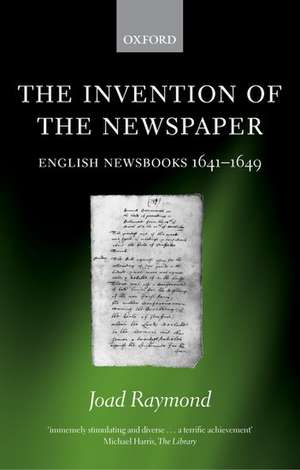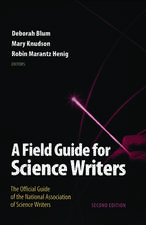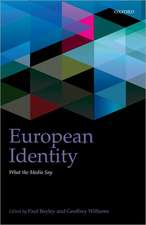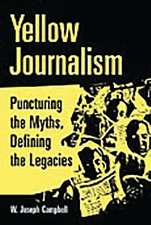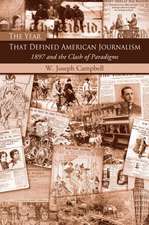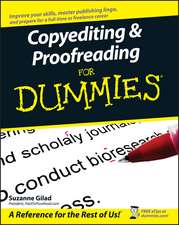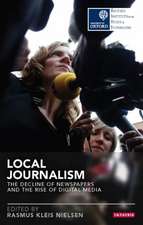The Invention of the Newspaper: English Newsbooks 1641-1649
Autor Joad Raymonden Limba Engleză Paperback – 7 iul 2005
| Toate formatele și edițiile | Preț | Express |
|---|---|---|
| Paperback (1) | 340.62 lei 31-38 zile | |
| OUP OXFORD – 7 iul 2005 | 340.62 lei 31-38 zile | |
| Hardback (1) | 850.47 lei 31-38 zile | |
| Clarendon Press – 24 oct 1996 | 850.47 lei 31-38 zile |
Preț: 340.62 lei
Preț vechi: 468.33 lei
-27% Nou
Puncte Express: 511
Preț estimativ în valută:
65.18€ • 68.05$ • 53.94£
65.18€ • 68.05$ • 53.94£
Carte tipărită la comandă
Livrare economică 24-31 martie
Preluare comenzi: 021 569.72.76
Specificații
ISBN-13: 9780199282340
ISBN-10: 019928234X
Pagini: 400
Dimensiuni: 138 x 215 x 22 mm
Greutate: 0.5 kg
Ediția:Revised
Editura: OUP OXFORD
Colecția OUP Oxford
Locul publicării:Oxford, United Kingdom
ISBN-10: 019928234X
Pagini: 400
Dimensiuni: 138 x 215 x 22 mm
Greutate: 0.5 kg
Ediția:Revised
Editura: OUP OXFORD
Colecția OUP Oxford
Locul publicării:Oxford, United Kingdom
Recenzii
Review from previous edition In this immensely stimulating and diverse work, Raymond succeeds in keeping the different components of theory and description in balance. From the point of view of newspaper history the work is a terrific achievement. Raymond's material provides an important and stimulating contribution to many of the debates about the way English society worked in the mid-seventeenth century.
Dr Raymond has carried out a diligent and ambitious examination of the earliest stages of the newsbook over a relatively short period ... Raymond has some interesting things to say about the readership and editors of the early newsbooks
Raymond has performed a public service by examining the transformation of the newsbook from 'a plain and non-controversial narrative of parliamentary proceedings into a bitter and aggressive instrument of literary and political faction.' We should, he urges, pay less attention to what contemporaries said about newsbooks and more to what they did with them. All seventeenth-century historians will benefit by reading this book.
richly researched and documented ... offers a keen analysis and broad samplings of one of the main discursive forms.
Raymond's book is a superb account of the history and function of the English newsbook; it examines every aspect of the writing, printing, publishing, distributing and reading of the news in the 1640's ... Erudite and engaged, Raymond looks deeply at the particulars of newsbooks in the 1640's and beyond them to a range of significant issues ... What emerges is a striking portrait of that busy and often chaotic traffic between and among authors, copyists, printers, vendors and readers of the news.
Dr Raymond has carried out a diligent and ambitious examination of the earliest stages of the newsbook over a relatively short period ... Raymond has some interesting things to say about the readership and editors of the early newsbooks
Raymond has performed a public service by examining the transformation of the newsbook from 'a plain and non-controversial narrative of parliamentary proceedings into a bitter and aggressive instrument of literary and political faction.' We should, he urges, pay less attention to what contemporaries said about newsbooks and more to what they did with them. All seventeenth-century historians will benefit by reading this book.
richly researched and documented ... offers a keen analysis and broad samplings of one of the main discursive forms.
Raymond's book is a superb account of the history and function of the English newsbook; it examines every aspect of the writing, printing, publishing, distributing and reading of the news in the 1640's ... Erudite and engaged, Raymond looks deeply at the particulars of newsbooks in the 1640's and beyond them to a range of significant issues ... What emerges is a striking portrait of that busy and often chaotic traffic between and among authors, copyists, printers, vendors and readers of the news.
Notă biografică
Born in Cardiff, Joad Raymond took his BA in English and History at UEA, then proceeded to the University of Oxford to do a D.Phil. Between 1993 and 1995 he held a reearch fellowship at Magdalen College before moving to a lectureship at the University of Aberdeen. He has been Senior Lecturer in English Literature, at UEA since 2000.
